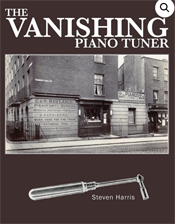Did You Know Piano Facts
Tuning Temperaments
How many piano tuning temperaments are there?
There are countless variations, but most fall within three major categories;
1. Meantone, which generally concentrated the dissonance into a few unusable intervals (often called "wolf" intervals), so that the others could be Just. These are often called "restrictive" tunings, since there are certain intervals that are not usable. Good intervals are really good, bad ones are really bad. The Meantone era was approx. 1400-1700
2. Well-Temperament, which gives more consonance to the most often used keys, and more dissonance to the lesser used ones. Though not equal, these tunings are "non-restrictive" because all intervals can be used. The intervals range from Just to barely acceptable. Well-temperament refers to a genre, not a specific tuning. The Well-Tempered era is approx. 1700-1880.
3. Equal Temperament, which spreads the dissonance equally among all intervals.
There is no difference in consonance or dissonance between any keys, thus, there are no good ones or bad ones. Equal temperament represents a complete average. Dates of its acceptance are debated, but there is ample evidence that it was widely available by 1900 and is the predominate tuning on keyboards, today.
r.



